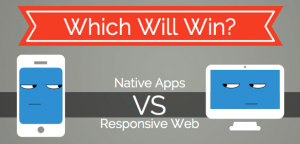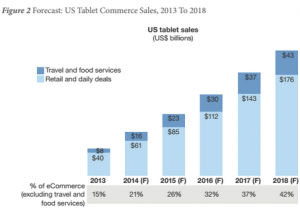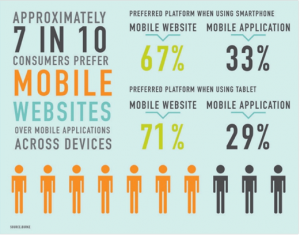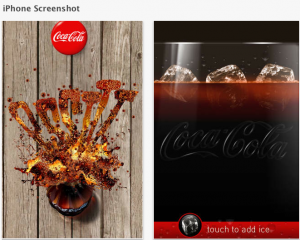Firstly the question that business owners must ask themselves is: Do I need an app at all? For instance, if you are own a law firm who primarily interacts vis in-person consultations or over the phone, then no, you probably do not need a mobile app. The same is true for a owner with one or two locations.
An increase popular option for companies that are looking to move into mobile, but lack the budgets to support separate apps for each mobile platform and without the needs of something more complex such as mobile web App. However, if you offer an existing web service for users logins and account management, a mobile app is probably going to be a worthwhile investment, as it will provide tremendous performance benefits over using mobile web (Warren, 2013).
If you have a business that is delivered through technology such as (AirBnB and Uber), it could be tough choice whether to go to a website or an app first. The answer may lie in your understanding of your target audience (Varshneya, 2014).
How best do you think you can reach out to them? How are they currently performing the tasks that you wish to simplify? Answers to this will help you determine whether your product merits a web first or a mobile strategy.
64% of App users stated that they view brands that have Native Apps more favourably than others that don’t have (Luxury Institute, 2012). Forrester Research estimated that sales from consumer shopping on mobile phones would increase to $38 billion in 2014. Sucharita Mulpuru, the Forrester analyst behind the research, attributes the increase to the fast pace of consumer adoption of smart phones. American is growing this “comfort shopping”devices and for this reason more merchants are working to improve the mobile shopping experience. Mulpuru estimates for 2018 that mobile commerce sales will top $293 billion in America.
Below are examples of how successful an app can be:
Great invention -mobile coupon.
Who wants to carry around a bunch of pieces of paper, when you can do everything from a svelte mobile device? Smart mobile marketers knew that mobile coupons were next frontier. Humans are wired to love discounts and deals. Why not deliver them on the smartphone? That’s why users love mobile coupons. As study from Key Ring reported, mobile users- 75% are using coupons and 80% of shoppers said their perception of a retailer would improve if the retailer offered mobile deals and coupons as reported by Mobile Commerce Daily (Patel, 2014). A user will probably download an app if the coupons are given only via native app.
Clever Marketing with Mobile during holiday season.
One third of all ecommerce purchases were made on a smartphone during 2013 holiday shopping season (2013).Instead of calling it “Black Friday,” Custora dubbed the day “Mobile Friday”. Nearly 40% of purchases on the biggest shopping day of the year were made on mobile devices. Black Friday is traditionally the day when shoppers wake at ungodly hours, freeze in long lines, and trample one another in an effort to buy big-screen TVs and discounted vacuum cleaners. But who wants to risk life and lose sleep if they can cozily snag a deal in the comfort of their very own bed? Cyber Monday is giving way to a cyberized and mobilized Black Friday.
Lessons learned:
- Get creative with discounts such as discounts on a holiday season. Think about the timing.
- Mcommerce is on the rise so Ecommerce professionals should not ignore the benefits of it.
Below are the technicalities behind, Responsive Web, Native Apps and Mobile Web:
Responsive Web
Applications with a responsive web design apply a different style (or set of styles, depending on device size) primarily based on cascading style sheets (CSS). The server can decide the design when serving the application, the design can be applied at the client level, or both can occur. The idea is to have a single source of content that renders differently based on a device’s features. In addition to being a solution for mobile web applications, it’s also useful for other types of devices such as tablets, game consoles and televisions (Serrano et al, 2013).
Native Apps
The companies that build mobile Oss want Apps that are specific to their own environments that can take full advantage of their particular features. This requires developing the app using that provider’s language and framework, ie: using Xcode with Objective-C for iOS and Eclipse with Java for Android. Thus, one project must be maintained for each OS, which leads to an increment in developing a team, costs and time. Moreover, developers must address the fact that in addition to multiple existing Oss, new ones continually appear (Serrano et al, 2013).
Mobile Web
It usually has a better feel and touch than the responsive web because it renders the user interface controls (such as buttons, selectors and text boxes) in a way that’s similar to a native app.
Warren (2013) suggests that businesses should absolutely start with a mobile friendly site and make sure that it is frequently updated to be fast, efficient and work well on multiple devices. However, Serrano et al, 2013 argued that there isn’t a single solution for choosing which mobile application will be best for every situation. Several technical criteria can help us narrow down our options to select the most suitable development approach for a given situation. If the goal is to build an app with the support for multiple platforms, a Mobile Web approach is a better choice than a Native App, which must be developed specifically for each mobile platform.
Perspective form user preference:
Warren (2013) argues that users feel more comfortable making large dollar purchases using a native app rather than a mobile web especially because it works along side your device’s built in features offering:
- More advanced graphics and effects,(native code offers better user experience)
- Strong mobile engagement
- Full support from concerned app store.
However Patel says that most users want a mobile experience without the barrier of a mobile app. Patel (2014) says that is unnecessary when a user has to download an app in order to browse or complete a transaction as many users don’t want yet another app. What they want is the lightweight experience of being able to do what they want to do without that extra step since they are not interested in becoming loyal customers of your brand or store. They are just looking for a good deal. In addition, user still has to click on a link and then click to download it, incurring data charges if they are not using wifi (Johnsons, 2012).
Flurry, a mobile as agency, performed a comparative study of app downloads over three consecutive holiday shopping seasons. What they discovered is that the number of downloads during the peak holiday shopping had declined year-over-year local businesses and retailers have to decide whether they are going to develop an app, or whether they are going to stick to a mobile-optimized experience (Patel, 2014). Which shows that downloading an app may not be the best option.
Native Apps have a lot of advantages to mobile web, but users are willing to forego this in order to have the quick and easy solution of browsing directly from their mobile browser (Patel, 2014). As early as 2012, ABI Research predicted that “smartphone users around the world would be downloading and using fewer and fewer apps”.
Perspective from Business preference:
Even though companies are looking to move into mobile, they may lack the budgets to support separate apps for each mobile platform also they are (Warren, 2013):
- Expensive to develop
- Maintenance costs are high
- Require frequent update
Varshneya (2014) suggests that when you are not sure which mobile platform you want to build first (because building both at the same time is more expensive and makes the iterative process tedious), a responsive website can come to the rescue as they are:
- Built using style sheets that make them responsive to different operating systems (Johnsons, 2012)
- Easier to maintain and less expensive
- Instantly available (no download required)
- Can be updated instantly and also it is found easily
- Broader reach
A responsive website enables both Android, iOSA and any other mobile OS users to interact with your brand with a similar experience. You build only once and get your desktop and all mobile platforms covered. This also helps you in validating your source of traffic, building your product with analytics integrated at this stage to get a sense of the traffic flowing from different devices.
Once you realize which devices your customers are using the most to access your responsive website, you can then build a customized native app solution for them (Varshneya, 2014). However, Warren (2013) suggests that before Mcommerce companies should look at who their users are — what platforms they use, the average transaction price (studies continue to show that users feel more comfortable making large dollar purchases using a native app rather than the mobile web) and how well their current web solutions work with features such as shopping carts, time outs and more.
Most importantly businesses must pay attention to how many sales need to take place each month through an app to pay for its development. If that seems feasible, building a native app to offer alongside the responsive experience is a great idea (Warren, 2013). A website makes more sense for information dissemination, which educates the customers about the brand and its offerings. A responsive website helps kill two birds with the same stone. You get the attention of the desktop surfer as well as those who are browsing or researching about on the go (Varshneya, 2014).
While you will build a responsive website, which is the natural choice to inform your target audience about your brand, you can further engage your prospective and existing customers through a mobile app.
You could build a small app that enhances your brand value, such as what Coca-Cola did with its fun iOS app.
Final thoughts:
Even though there is a debate between responsive web and a native app, if your are building a website it has to be mobile or tablet enable (responsive). Thus, a responsive web seems to be a better option especially for businesses that have a small budget. It is important to bear in mind that customers will make purchases on a mobile web, but they will only do so if it’s easier than downloading your mobile app. If you don’t have a mobile web already, you’re missing out on a huge potential audience.
Commerce is a tricky area for native app vs. mobile web debate because the answer can really vary depending on the type of products being sold and the audience (how frequent the person visits the online shop). It can be argued that mobile web will remain competitive until apps can offer a substantially better user experience and will be cheaper for business to develop.
References:
Johnsons 2012. App Development: Making the case for mobile websites. Sunday Business Post. Available at: http://search.proquest.com.ezproxy.brighton.ac.uk/docview/1221044555
Luxury Institute, LLC. 2012. Home. [online] Available at: http://luxuryinstitute.com/luxury/
‘Mobile Shopping App makes move onto web’. Journal (Newcastle-upon-tyne UK)(2012) Available at: http://search.proquest.com.ezproxy.brighton.ac.uk/docview/1019035636?pq-origsite=summon&http://ezproxy.brighton.ac.uk/login?url=accountid=9727
Patel, N (2014) ‘Surprising Mobile Ecommerce Statistics that will change the way you do business. KISSmetrics. Available at: https://blog.kissmetrics.com/surprising-mobile-ecommerce/
Serrano et al (2013) ‘Mobile Web Apps’ IEEE Software. Published by the IEEE computer society. Avaible at: http://ieeexplore.ieee.org.ezproxy.brighton.ac.uk/stamp/stamp.jsp?tp=&arnumber=6588524
Varshneya, R. (2014) Responsive Website or Mobile App: Do You Need Both? Enterpreneur. Availalble at: http://www.entrepreneur.com/article/235981
Warren, C. (2013) ‘Should You Build a Responsive Site or a Native Mobile App?’. MashableUK. Available at:
http://mashable.com/2013/08/06/responsive-vs-native-app/






